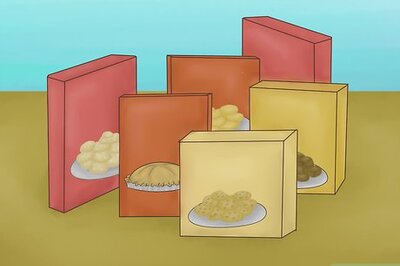
views
Daraa: The Syrian government pledged on Thursday to consider lifting some of the Mideast's most repressive laws in an attempt to stop a week-long uprising in a southern city from spreading and threatening its nearly 50-year rule.
The promises were immediately rejected by many activists who called for demonstrations around the country on Friday in response to a crackdown that protesters say killed dozens of anti-government marchers in the city of Daraa.
"We will not forget the martyrs of Daraa," a resident told The Associated Press by telephone. "If they think this will silence us they are wrong."
The coming days will be a crucial test of the surge of popular discontent that has unseated autocrats in Tunisia and Egypt and threatens to push several others from power.
On one side in Syria stands a regime unafraid of using extreme violence to quash internal unrest. In one infamous example, it leveled entire sections of the city of Hama with artillery and bulldozers to put down an uprising by the Sunni Islamist Muslim Brotherhood in 1982.
Facing the regime is a loosely organized protest movement in the main city of southern Syria's drought-parched agricultural heartland.
Sheltering in Daraa's Roman-era old city, the protesters have persisted through seven days of increasing violence by security forces, but have not inspired significant unrest in other parts of the country.
"Even if the government can contain violence to Daraa for the time-being, protests will spread," Joshua Landis, a Syria expert at the University of Oklahoma, wrote in a recent blog posting. "The wall of fear has broken."
President Bashar Assad, a close ally of Iran and its regional proxies, Hezbollah and Hamas, appears worried enough to promise increased freedoms for discontented citizens and increased pay and benefits for state workers - a familiar package of incentives offered by other nervous Arab regimes in recent weeks.
"To those who claim they want freedom and dignity for the (Syrian) people, I say to them we have seen the example of Iraq, the million martyrs there and the loss of security there," presidential adviser Buthaina Shaaban told reporters in the capital, Damascus, as she announced the promises of reform.
Shaaban told reporters that the all-powerful Baath party would study ending a state of emergency that it put in place after taking power in 1963.
The emergency laws, which have been a feature of many Arab countries, allow people to be arrested without warrants and imprisoned without trial. Human rights groups say violations of other basic liberties are rife in Syria, with torture and abuse common in police stations, detention centers and prisons, and dissenters regularly imprisoned for years without due process.
Syria's state TV said later Thursday that Assad ordered the release of all detainees in connection with the unrest of the past few days.
Shortly afterward, Abdul-Karim Rihawi, who heads the Syrian Human Rights League, said authorities released several activists, writers and bloggers who were detained in different parts of Syria in an apparent response to events in Daraa.
Rihawi said those released included Mazen Darwish, a journalist and activist, and writer Loay Hussein.
Shaaban said the Baath Party Regional Command, the country's top decision-making body, would draft a law to allow political parties besides the Baath, and loosen restrictions on media. It was also raising salaries for public servants by up to 30 percent, giving them health insurance, and looking at better ways to fight corruption, she said.
Shaaban said Assad had given orders for security forces not to open fire in Daraa but acknowledged "there were, maybe, some mistakes."
There were no reports of new deaths in Daraa, but unrest there continued, with massive crowds shouting "Syria, freedom!" as they marched toward one of the agricultural hub's main cemeteries to bury the dead, according to an activist in touch with people in the city.
In Washington, the White House condemned what it called the Syrian government's brutal repression of demonstrations and the killing of civilians by security forces. White House press secretary Jay Carney said those responsible for the violence must be held accountable.
Looking to become more self-sufficient, Syria's socialist government launched a massive state-run wheat growing project in the 1990s and began pumping massive amounts of water from the aquifers around Daraa, leaving private pasture and farmland increasingly parched.
Small farmers and herders increasingly moved into the province's main city and surrounding villages, looking for work and in many cases growing angry at the lack of opportunity.
As a result, tensions have been rising around Daraa in marked contrast to the prosperous cities of Damascus and Aleppo. There, wealthy Sunni merchant classes have loaned their political support to the minority government of Alawis - members of a branch of Shiite Islam - in exchange for relatively generous amounts of personal and economic freedom.
Media access to the marches in Daraa was restricted, but an Associated Press reporter heard sporadic bursts of gunfire echoing through the city in the afternoon. Almost all shops were shuttered, the streets were virtually empty and soldiers and anti-terrorism police stopped people at checkpoints and manned many intersections - the heaviest security presence since the unrest began.
A resident of Daraa who was reached by phone from Damascus said witnesses there reported seeing at least 34 people slain when police launched a relentless assault Wednesday in Daraa's old city, fatally shooting many in an operation that lasted nearly 24 hours.
Videos posted by activists on YouTube and Twitter showed dead and wounded people lying on a street in Daraa, as heavy gunfire crackled nearby and people shouted in panic.
Ahed Al Hendi, a Syrian dissident and Arabic program coordinator for the US-based human rights organization cyberdissidents.org, said at least 45 people were killed on Wednesday.
Shabaan blamed media "exaggeration" for inflated figures and said 34 people had been killed in the weeklong conflict in the city.
Troops were in total control Thursday of the area around al-Omari mosque, where protesters had sought shelter and most of Wednesday's fighting occurred. Elsewhere, the only evidence of fighting were rocks that littered the streets and the remains of tires that had been set on fire by protesters the day before.



















Comments
0 comment